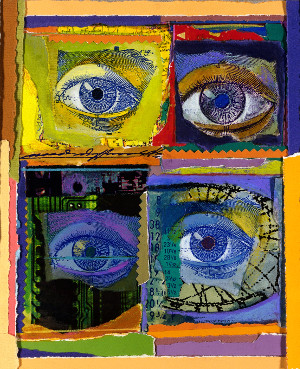LENS Business, Law, and Policy
Why Not All Stereotypes Are Bad
Using Generalizations to Help Make Better Decisions
 IMAGE: Jane Sterrett / Theispot
IMAGE: Jane Sterrett / TheispotWe often speed through our fast-moving, complicated world using limited information to make tough decisions. But taking the right shortcuts isn't easy, said Dale Nance, JD, the John Homer Kapp Professor of Law at Case Western Reserve. In his new book—The Burdens of Proof: Discriminatory Power, Weight of Evidence, and Tenacity of Belief—Nance digs into complex decision-making in the midst of uncertainty. And in an undergraduate seminar he taught this year, Nance focused on the use of stereotypes in everything from regulating dangerous dogs to profiling potential terrorists. We asked him to explain the good and the bad of generalizations.*

Dale Nance, professor
Many people shy away from the idea of making decisions based on stereotypes. Why? Stereotype has a negative connotation. But a stereotype is simply a generalization about how a group of people behaves. It may be statistically accurate but not universally valid. Many believe we shouldn't make decisions a ecting an individual based on a stereotype, even if it is statistically accurate. Say a person wants to make a decision by relying on a generalization that "Children reared by single parents are more likely to be involved in criminal activity." Someone else may respond, "What about the single-parented children who don't fit this generalization?" It's one thing to challenge a generalization as inaccurate or to suggest a different generalization for use in the particular context. It's quite another to say we should ignore an accurate generalization just because there are exceptions to it. The real question is: What makes some uses of stereotypes inappropriate and others appropriate?
What are examples of useful stereotypes?
Age requirements. Most accept that a person should be a certain age to vote or drive a car. Neither is based on universally valid generalizations: Some 25-year-olds shouldn't be voting and some 16-year-olds would be competent to do so. Some 12-year-olds could reasonably drive a car. Nor is individual testing always a workable solution to such problems. Testing is expensive and not without its own errors and abuses. Imagine the controversies that would attend any individualized test for voter competence. Who would be trusted to design such a test? Even for something like driving skill, if we are con dent that the vast majority of 12-year-olds would be poor drivers, is it worth the costs of giving all 12-year-olds the opportunity to take some test that most will fail?
How, then, should we think about stereotypes?
First, it's naive to say you can't use a generalization about a class of people unless it's universally valid—we use such stereotypes all the time and would be paralyzed without them. Second, working out the ways in which the use of a stereotype can go wrong
is important, as is determining when some alternative, like individualized testing, is appropriate. Many generalizations, like those based on race or gender or religion, are rightly subject to special scrutiny because of their historical misuse. But even here, it would be an error to say that use of a stereotype is 'wrong' just because there exist exceptions to the generalization upon which it is based.





